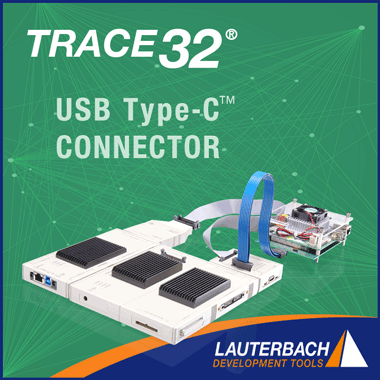LAUTERBACH INTRODUCES NEW DEBUGGING OPTIONS
NewsDebugging via USB Type-C connector

Lauterbach, the world’s leading debug tools provider, has successfully completed its proof of concept for debugging and tracing an embedded target via a USB Type-C™ connector. A design based on an Arm processor and implementing both Serial Wire Debug (SWD) debug and 4-lane High Speed Serial Trace Port (HSSTP) has been created.
The USB Type-C™ standard allows for switching the connector configuration to assign non-USB functions to the pins. This allows special configurations to be created that assign debug and trace functions to the pins. In its simplest form, this only encompasses 2-pin debug like SWD. Fully deployed, this may include 2 debug pins and 4 serial trace lanes. USB Type-C™ pins not required for debug and trace can still operate as normal. For example, a fully functional USB 3.1 interface can run alongside a 2-pin debug solution.
Lauterbach offers two types of TRACE32 USB-C Breakout modules:
- A debug solution, based on the Lauterbach TRACE32 PowerDebug unit, that enables a 2-pin debug interface without sacrificing any of the functionality of the USB 3.1 SuperSpeed lanes;
- A full solution, based on the Lauterbach TRACE32 PowerDebug and PowerTrace Serial combination, that enables 2 pin debug and 4 serial trace lanes.
Both Breakout modules include the functional connections as well as the debug/trace connection. They also have the ability to handle the configuration channel and can supply power to the target.
The example implementation shows the full solution providing both SWD debug and 4-lane HSSTP. The implementation is not limited to single debug/trace configuration. It is fully configurable via the debugger´s GUI. The advantage to the system developer is the ability to reuse an existing connector of the final form factor for debug and trace purposes.





